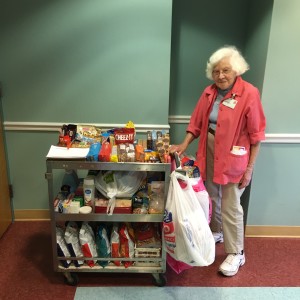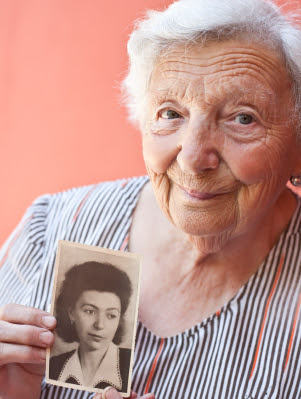Category: Money Issues
Posted by Dr. El - March 29, 2016 - Business Strategies, Customer service, Inspiration, McKnight's Long-Term Care News, Money Issues, Resident care, Something Good About Nursing Homes, Volunteering

Here’s my latest article on McKnight’s Long-Term Care News:

A few months ago, I was consulting at the Margaret Tietz Nursing and Rehabilitation Center in Jamaica, NY, when a remarkable woman named Trudy Schwarz walked down the hall. Her noteworthy qualities were obvious in several ways.
A diminutive woman, she nevertheless was pushing a sizable rolling metal cart filled with all manner of neatly arranged goods. This was despite being as old or older than many of the residents at the facility.

She exuded a calm, pleasant demeanor enhanced by her smile and her peach-colored lab coat as she purveyed merchandise from what I’ve previously termed an “independence cart,” an essential yet rare enterprise in long-term care.
“Trudy’s here!” exclaimed the resident I’d been speaking with, excusing herself for a moment to exchange a few dollars for a bottle of lotion. “She buys me the things I can’t get here. She’s a real lifesaver.”
It was a sentiment I heard echoed by many other residents over the next few months.
Overcoming systems failure
An “independence cart” is a small store on wheels that brings goods to residents. While many residents have personal needs allowances and therefore a small amount of money for purchases, it’s virtually impossible for many frail elderly to spend it due to a systems failure within long-term care communities.
Residents generally have no access to a store unless it’s one that visits their facility or they’re physically able to go off-campus with a family member or as part of a staffed excursion. Social workers are usually too inundated with other tasks to assist with online purchases and most residents don’t have access to a credit card, debit card or PayPal account necessary for web-based transactions anyway. Residents without family members to make purchases on their behalf are left to ask for help from staff members who sometimes assist them out of kindness — but against facility policy.
The psychological impact
For the entire article, visit:
Posted by Dr. El - June 30, 2014 - Customer service, McKnight's Long-Term Care News, Money Issues, Tips for gifts, visits

Here’s my latest article on McKnight’s Long-Term Care News:

It was noon at the nursing home and the staff was busy wheeling residents into the dining room. “Are you going to buy me lunch today?” an aide joked as she unlocked the brakes on Mr. Romano’s wheelchair. He smiled, but I could tell he was pained. He’d just spent his last psychotherapy session discussing his now-meager funds after a lifetime of earning and saving.
In my conversations with hundreds of long-term care residents over the years, I’ve found money to be an almost universally sore subject among them. Since money is a primary concern for most of us throughout our adult lives, it should come as no surprise that financial concerns continue to be a stressor for our residents even though they’re living in the mostly money-free society of LTC. The reasons for this financial tension vary, and with some adjustments we can reduce aspects of our residents’ financial distress.
Money stress sources and remedies
• Spending down: Residents who saved money during their lives and are now spending their savings to qualify for Medicaid are particularly sensitive to, shall we say, variations in care.
“This is what I’m paying for?” they’ll ask with incredulity at an unpalatable meal or an unpleasant interaction with a staff member. It’s a bitter pill to scrimp all one’s life and have to pay out of pocket for healthcare with savings, particularly when the lifelong free spender in the next bed is getting exactly the same care paid for by Medicare and Medicaid.
Remedy: While we can’t change the fact of the spend down (and it should go without saying that we provide the best service possible to every resident at all times regardless of their funding source), we as experts can offer suggestions for spending down that allow residents to make the most of this period.
o For example, elders might want to buy a television set, some extra clothes and other belongings they’ll be able to enjoy once they’ve qualified for Medicaid and don’t have as many funds to access. Perhaps they’d like to buy themselves flowers or fruit that arrives monthly for the next year so that they have some luxury in their lives when things get tight. New residents and families have never spent down before and they need our advice about what’s permissible and likely to make them happy in the years to come.
o Residents may be legally allowed a financial gift to a family member who can then use that money for them at a later point.
o Encourage seniors to put aside money for a burial fund, if needed, so that they don’t have to worry about this later in life. Money for burial isn’t counted toward the maximum amount residents are allowed to hold in their personal accounts.
• Personal Needs Allowance (PNA): Residents are entitled to a monthly PNA that allows them to buy things such as clothing, haircuts, special trips and other items not provided for by the facility. Unfortunately, when this amount — which varies by state — was determined back in 1980, no provision was made for inflation. In New York, the $50 PNA from 1980 is now worth $17.32. If the PNA had been adjusted for inflation, the resident would be getting $144.36 each month, which is a reasonable allotment that would permit people to buy the aforementioned goods and services, plus some takeout food or an occasional gift for their grandchildren. Managing personal needs on $50 a month in 2014 is beyond challenging. (For more on this, see the Money Issues anecdotes at My Better Nursing Home and the “Your Money” chapter of The Savvy Resident’s Guide.)
Remedy: Clearly, PNA levels should be adjusted for inflation, but for now we can help residents living on a very tight budget in several ways.
For the entire article, visit:
For a humorous take on one resident’s efforts to manage her money, click on Aunt Sylvia Spends Down (http://youtu.be/5ZpdhO9HNmc) or watch below.

Posted by Dr. El - April 11, 2011 - Anecdotes, Money Issues
Stella had been in the nursing home several years before anyone had thought to refer her to the psychologist. She sat in her room reading her bible all day, emerging only for showers.
“Why don’t you try some of the activities?” I asked her. “They have lots of good stuff here — even church services,” I added hopefully.
“It ain’t my denomination,” she replied. “I don’t want to go.” She ran her hand absently across the worn cover of her bible, the pages dog-earred and frayed.
I scanned the room for other signs of interest and spied a small photo tacked to her bulletin board. “Would you mind if I take a look?” I asked her.
“No, go ahead. That was me with my girlfriends from church. Ooh-ey, we did like to travel. I went everywhere with them ladies.”
“And where were you in this photo?” I took the picture to her.
“We was at a convention in Baltimore.” She laughed. “That was some fun. This here’s Mayella. She been gone eight years now. And that one’s Ray Ann. She went down South to be with her family. And there in the middle — that’s me!”
I put on my glasses to get a better look at the tiny image of a buxom woman in a lavender gown and dramatic wig. “Wow! Look at you!”
Stella giggled. “I liked to dress up in them days. All my money went to clothes and travel. Arthur, God bless his soul, took care of everything else.”
I noted her dingy housedress and hair plaited into two simple braids. “If you enjoyed it so much, how come you don’t dress up more now?”
“Ain’t got no money,” she said simply. “I been wearing this dress ever since I got here.”
“What do you spend your personal needs allowance on?”
“My what?”
“Your personal needs allowance — the $50 you get each month after the rest of your stay is paid for.”
“Nobody told me about no money.”
I frowned. “Well, you should be getting it. Let me make some phone calls. Hold on a minute.” I left the room and returned triumphant. “You’ve got $1,850 in your account downstairs!”
“What!” Stella’s face lit up. “Why I got so much money?”
“If you’ve been here for three years getting $50/month you never spent, that adds up.”
“What I got to do to get it?”
“They said I could bring you down now if you want.”
“Let’s go.” She placed her bible on her tray table. “I want to buy me and my roommate some egg rolls tonight. Her people been treating me ever since I been here.” She started rolling herself toward the door and I jumped up to push her chair.
Stella never became a regular at activities, but she did enjoy the attention she received when she came down to the lobby to pick up her take-out food in her new wig and colorful dresses.
Posted by Dr. El - April 4, 2011 - Anecdotes, Money Issues
“I wish my boys weren’t so busy,” Greta commented. “I’d really like to get some new dresses and I have no one to take me.”
Greta’s boys were always “busy.” There were two names listed on the face sheet of her chart, but I’d never seen them or met anyone at the nursing home who had. When I asked Lynne, her social worker, about them, Lynne’s normally pleasant tone became one of controlled anger.
“Do you know how many messages I’ve left for them? They never respond! They just left her here! I feel so sorry for her.” We agreed it was a bad situation, made worse because Greta wasn’t a United States citizen and therefore had no personal needs allowance. She was flat broke.
Greta lamented, “I came to this country because of them, and now they don’t have time for me.” She glanced at a photo of her well-dressed youthful self. “I just want to get some new clothes.”
I went back to Lynne. “Do you think we can get her citizenship?” A few weeks back the nursing home had held a touching celebration for two residents who had recently become U.S. citizens.
Lynne shook her head. “I tried. Her family won’t bring in the paperwork and they can’t grant citizenship without it.”
“That really stinks. The poor lady just wants some clothes, and she’s got nothing to buy them with. I actually brought in a couple of things for her,” I admitted. “I try not to do things for one resident I wouldn’t do for any other, but I can’t help myself.”
Lynne smiled. “I’ve been bringing her things too.”
“Out of your social work salary, huh? Remember in school when we learned that the basic needs of human beings were food, clothing, and shelter? I wonder why nursing homes don’t provide clothing.”
“They can get leftover things from the laundry,” Lynne pointed out. “And sometimes people make donations.”
This accounted for the fact that Jewish residents sometimes had Christmas sweatshirts, non-drinkers wore beer t-shirts, and men occasionally sported tops proclaiming they were the “World’s Greatest Grandma.”
I sighed, and went home to search through my closet for good-looking items I wasn’t really wearing.
Posted by Dr. El - March 28, 2011 - Anecdotes, Money Issues
“It’s not right,” Carlos complained. “That son of mine isn’t telling me what’s going on with my money.”
“You’re worried about your finances?” Carlos had been anxious and irritable for most of the three months since his admission to the nursing home.
“Yes!” He pounded one fist into another. “I know how to take care of my bills! I’ve been doing it all my life! Who is he to take over?”
I’d heard similar concerns many times over the years. “It’s hard when the kids start acting like the parents,” I empathized, “but there really aren’t bills to worry about now.”
“How can there be no bills? Who’s paying for me to be here?” he asked angrily.
“Well, Medicare and private insurance when you first got here, but now that you’re long-term, your stay will be covered by Medicare and Medicaid.”
“But what about my rent? And my doctor’s bills?” His tone softened only slightly.
“All that’s covered, ” I explained gently. “You’re basically living in a money-free world now.”
He looked puzzled.
“Your food, medication, doctor’s bills — that’s all paid for,” I told him. “You don’t have to worry about it. You’ll get $50/month here in New York for things like your telephone, clothes, take-out, or a special trip. Otherwise you can pretty much live without money.”
“Humph!” Carlos replied, staring out the window for a moment before turning back to me. “Well, I want to see my phone bills. My son better bring those to me!”
Posted by Dr. El - March 21, 2011 - Anecdotes, Money Issues
James Hawkins, III liked to sit in the lobby drinking tea and watching the passersby. At 93, he spoke about his well-traveled childhood, his Ivy League education, and a lost love and penchant for liquor that had led to the life of a bachelor. He confessed his virginity, and then later on, another confession:
“I’m not worried about dying itself. When you’re done, you’re done. That’s it.” He scratched his head. “But all that family money is gone and I’ve got nothing to bury myself with.” He threw up his empty hands.
I marveled silently at this. The man had been a banker. “What about your cousin? Can he help you out?” I’d met him once during his monthly visits, which had declined in frequency since his car broke down. I realized as soon as I asked it the futility of the question.
“He’s from my mother’s side of the family and he’s broke. I’ve got a few cousins on my father’s side, but I don’t feel comfortable asking them.”
We sat in silence for a moment.
“It’s not that I care so much for me if I go to Potter’s Field, but it’s not the way we Hawkins’ are buried.”
“No?”
“No. There’s a certain decorum. It wouldn’t look right.”
“I see.”
He hesitated. “I’m thinking of donating my body to science.”
I stared at him, surprised. “Really? That’s brilliant!”
“That’s what I thought,” he replied, pleased at my reaction. “I’d be doing some good, and then I wouldn’t have to worry about burial expenses. I hear they cremate you and give the ashes to your family.”
“That’s a great idea. I can’t believe nobody’s talked to me about this before.”
He smiled. “Can you look it up for me on your thingy?”
“My iphone? Sure.” I Googled it, and registered him to get an information packet from a site I found online.
——————————-
“Well, I got the papers we sent away for,” James informed me a couple of weeks later.
“Yes?” I prompted, eager to hear the details.
“I’m too old.” He gave an ironic laugh. “The cut-off is 90.”
“What! I can’t believe that — too old to donate your body,” I grumbled. “You want me to try another one? There have got to be more places.”
“No, not right now.” He waved away the notion. “Maybe later.”
I dropped the subject. James hadn’t been feeling well lately and I guessed the issue was too close for comfort.
——————————-
A month after that, James had a visit from his cousin. “We had a good talk and worked things out. I’m going to be cremated. It costs $1700 and he said he’d help me out. I don’t know what they’re going to do about the service, but at least that part’s taken care of.” His voice had lost the tension it had held during our previous conversations.
“That’s great, James.”
“I feel a lot better. I’m going to start saving up my Personal Needs Allowance to put toward the expenses. It won’t be much, though, after I get my monthly haircut.”
Nursing home residents in New York State get $50/month for their personal needs. Haircuts at the home cost $10.
He laughed. “I figured it out. If I don’t buy anything but haircuts for the rest of my life, I can pay for the cremation myself — I just have to live to 97!”
Posted by Dr. El - March 14, 2011 - Money Issues
Most nursing home residents are eligible for a Personal Needs Allowance (PNA) from Medicaid, which varies from state to state. In New York, for example, the PNA is $50/month. It’s been $50/month since 1980. There is no inflation adjustment, but if there had been one, residents would be getting $133.63 in 2011 dollars, according to the inflation calculator I used. Instead, their $50 in 1980 is now the equivalent of $18.71.
Fifty dollars a month doesn’t go far these days. A haircut, an off-campus trip, some take-out, and you’re done. Try buying new clothes on that salary.
Over the next few weeks, I’ll be posting anecdotes about residents and the money issues that arise for them in the nursing home.
___________________________________________________________________________________________
Links to money issues posts:
Post 2: https://www.mybetternursinghome.com/late-life-nursing-home-money-2-of-5-for-now/
Post 3: https://www.mybetternursinghome.com/flip-the-script-nursing-home-money-3-of-5-for-now/
Post 4: https://www.mybetternursinghome.com/clothing-and-citizenship-nursing-home-money-4-of-5-for-now/
Post 5: https://www.mybetternursinghome.com/the-recluse-nursing-home-money-5-of-5-for-now/
The “Your Money” chapter in The Savvy Resident’s Guide speaks directly to residents about this topic.
Below, Aunt Sylvia Spends Down:












